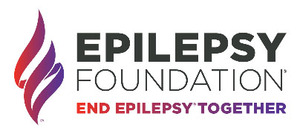LANDOVER, Md., Oct. 21, 2019 /PRNewswire/ -- November is National Epilepsy Awareness Month and the Foundation is rolling out #StaySafeSide, a nationwide effort to highlight the importance of recognizing a seizure and promote seizure first aid. The Foundation is also expanding a series of Public Service Announcements (PSAs) focused on seizure first aid to include two new markets — Tampa and Los Angeles, in addition to Chicago, Atlanta and Philadelphia. The #StaySafeSide PSAs are part of the Epilepsy Foundation's five-year cooperative agreement with the U.S. Centers for Disease Control and Prevention (CDC) and are designed to help improve the general public's awareness about seizure recognition and first aid.
"While we promote awareness throughout the year, this initiative comes at a time when more education is needed to increase public knowledge about epilepsy and seizure first aid," said Philip M. Gattone, M.Ed., president and CEO of the Epilepsy Foundation. "It is critical that everyone know what to do if they see someone having a seizure so that people with epilepsy are safer and protected. That's why, this November, we challenge everyone to join our National Epilepsy Awareness Month efforts to end epilepsy by learning seizure first aid and educating others in their community."
Epilepsy can affect anyone with a brain. Each year 150,000 more people are diagnosed with epilepsy. Over a lifetime, one in 10 people will have a seizure, and one in 26 will develop epilepsy. #StaySafeSide highlights how easy it is to help someone who is having a seizure with these simple steps — STAY, SAFE, SIDE:
- STAY with the person and start timing the seizure. Remain calm and check for medical ID.
- Keep the person SAFE and move away harmful objects.
- If they convulse or are not awake, turn them on their SIDE. Don't block their airway. Put something small and soft under the head. Loosen tight clothes around their neck.
- Never put anything in their mouth. Don't give water, pills or food until the person is awake.
- Do not restrain them.
- Stay with them until they are awake and alert after the seizure. Most seizures end in a few minutes.
- Call 911 if: the seizure lasts longer than 5 minutes; the person has difficulty breathing, is injured or pregnant; it's their first seizure; the seizure occurs in water; seizures continue; or the person does not recover.
The #ShareMySeizure initiative, which is in its fourth year of a five-year grant with the CDC, also includes strong digital and social media components featured on the Epilepsy Foundation's channels, as well as CDC platforms.
To learn more about seizure first aid, please visit epilepsy.com/FirstAid. For more information about #ShareMySeizure, please visit epilepsy.com/ShareMySeizure.
About Epilepsy
According to the World Health Organization, epilepsy is the most common serious brain disorder worldwide with no age, racial, social class, national or geographic boundaries. The U.S. Centers for Disease Control & Prevention (CDC) estimates that 3.4 million people in the United States are affected by epilepsy. It is the underlying tendency of the brain to produce seizures which are sudden abnormal bursts of electrical energy that disrupt brain functions.
About the Epilepsy Foundation
With a network of nearly 50 partners throughout the United States, the Epilepsy Foundation is leading the fight to END EPILEPSY®. The Foundation connects people to treatment, support and resources; leads advocacy efforts; funds innovative research and the training of specialists; and educates the public about epilepsy and seizure first aid. For more than five decades, the Epilepsy Foundation has shone a light on epilepsy to promote awareness and understanding, and to advocate for laws that matter to people with epilepsy, while also funding $68.7 million for epilepsy research and supporting 3,091 epilepsy investigators and specialists in their early careers. Over the past 18 years, in partnership with the CDC, the Epilepsy Foundation has helped to improve access to care for people with epilepsy, expanded its digital reach and online resources in homes across the country, and trained more than 500,000 school and community personnel in how to recognize seizures and administer seizure first aid. The Foundation has also assisted more than 123,470 people through its 24/7 Helpline in the past five years, and continues to focus on innovation, new therapies, community services, advocacy and education as key priorities. To learn more visit epilepsy.com or call 1.800.332.1000. Follow us on Facebook and Twitter.
SOURCE Epilepsy Foundation

Related Links
WANT YOUR COMPANY'S NEWS FEATURED ON PRNEWSWIRE.COM?
Newsrooms &
Influencers
Digital Media
Outlets
Journalists
Opted In





Share this article